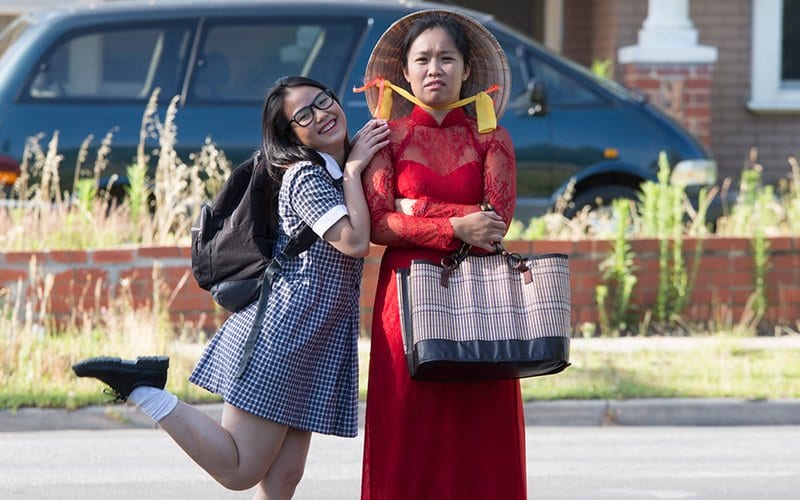Web series are having a moment. They launch careers and refine storytelling skills. They can be a quick, cheap(ish) way to convince broadcasters to fund an idea because you arrive with with a ready-formed audience.
Perhaps you’ve got a great idea for a web series that could be the latest Tik Tok sensation since The Formal or Cool Mum, or the next groundbreaking SBS Digital Original like SPA award-winning Latecomers or Iggy & Ace. Maybe you dream of winning CannesSeries, like Christiaan van Vuuren and Adele Vuko with their comic zombie killers in Over and Out.
But as attention spans shrink and the space gets saturated, how do you make sure your web series hits the mark and cuts through the noise? And how do you finance your project? We asked two experts for their tips.
Amanda Reedy is a screenwriter, story producer and writing coach whose credits include Superwog and Childish Deano – which won Best Comedy, Best Writing and Best Vertical Series at Stareable Fest in LA 2023.
Reedy says a common misconception beginners have about writing web series characters is that they need to be super complicated. ‘A good character needs a simple but strong dilemma and one character flaw that that works against them. From that you can build a compelling story.’
Serena Hunt is a 3rd generation Chinese Australian Producer and Assistant Director (Housos, Fat Pizza: Back in Business). In 2019, she released Phi and Me, the first Vietnamese-Australian comedy web series supported by Screen Australia and the web series won awards at Melbourne, New Zealand and Sicily Webfests.
Hunt says a common mistake when applying to funding bodies is thinking you are on your own. ‘There are people to help you. Build the relationship with the investment managers at Screen Australia – they are very approachable and friendly people.’
Hunt says another mistake that commonly arises from not getting advice is underestimating the budget. ‘There are a lot of additional costs to consider when you get a government grant, like money to cover legals, accounting and audit fees, and delivery items like additional drives and press kits. It can add up quickly.’
Amanda Reedy’s top five tips for writing a winning web series
- Be bold! There are no rules for a web series but you don’t have time to be timid. You need to capture the audience in the first 15 seconds, so don’t pull any punches. Hit us with the main character’s dilemma, a killer joke, or a big twist as soon as possible.
- Keep it simple. Each episode should have a simple story at its heart. Know what that story is before you start writing and plan how you’re going to get there. Beat sheets and outlines are just as useful for short form storytelling.
- Great characters. A great character needs a dilemma. To want something, but have obstacles to overcome to get want they want. Once you have that, you have the core of your story.
- Write for your audience and the platform they consume content on. If your audience is on TikTok then you need to craft your story to suit. Videos longer than three minutes don’t do as well with the current algorithm so writing a 10 minute series probably won’t rock the Tok. If your story needs to be more in depth and has a cinematic vibe, YouTube would be a better home. Do your research before you start writing.
- Hook. Every good story has a hook that has the audience coming back for more. If you’re writing a narrative you need to throw in a curveball at the end of each episode that hooks them in for the next episode. If it’s a sitcom, end with a banging joke so they can’t resist watching one more Ep!

Serena Hunt’s top five tips for financing a web series
- Know your project! As with anything, Have your end point in mind. Think about what you are trying to say and why you want to make it.
- Know what you are asking for from investors. Have a budget in mind. Know whether you are crowdfunding, going for government funding or private investment.
- Read everything carefully in the funding application form and ask for help or a second opinion.
- Have a good team around you. Filmmaking is a collaborative activity and it’s a lot more fun when shared with good people.
- Listen and learn. A good tip for life in general, really.
Serena Hunt will be conducting a half-day online workshop with Media Mentors on Funding Your Web Series on Saturday, 24 June, 10am–2pm. There’s a 20% discount here for ScreenHub members.
Amanda Reedy will be conducting a half-day online workshop with Media Mentors, teaching you how to Write a Sh*t Hot Web Series on Saturday 8 July, 10am–2pm. There’s a 20% discount here for ScreenHub members.





